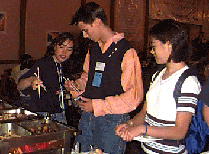
Japanese :
- Traditionally, Japanese usually eat with wooden chopsticks, holding their bowl close to chest level. However, they use Western utensils to eat Western food.
- Never place your chopsticks vertically in your rice bowl when you have finished. This is only done at funeral ceremonies. It is a sign of death and not acceptable.
- Although youth may eat while walking in public, it is considered bad manners for adults to do so.
- Instead of saying grace, they say "itadakimasu" prior to eating, meaning "let's eat", and conclude with "gochiso-sama desita", expressing your appreciation for the food.
- When eating the noodles, it is normal and perfectly acceptable to hearing loud slurping noises.
- Never pour your own drink in public, let others pour it for you. When you have had enough to drink, leave your glass full so that your host will know you are done drinking.
Korean:
- Items are passed and drinks are poured with the right hand, with the left hand supporting the forearm or wrist.
- Traditionally, they use stainless steel chopsticks and a porcelain spoon to eat with.
- Eating while walking on the street is not appropriate for adults.
- When sitting on the floor for a meal, men should cross their legs while sitting ,women (and men) should sit with their legs to the side, but never straight under the table
- When eating a meal, do not finish everything on your plate. This indicates that you are still hungry and that the host did not provide you with enough food.
- Do not put food taken from a serving dish directly into mouth.
- Transfer it to your plate or bowl first. Never pick up food with your fingers.
Indian:
- Since India is very diverse, eating practices vary in different regions, communities and within generation and religions. New habits and practices have been introduced and are being practiced in urban areas.
- Traditionally, Indians use their right hand when eating
- Hindus do not eat beef and Muslims do not eat pork.
- Eat only with the right hand, as the left hand is used for hygienic purposes and is considered unclean. However, it is acceptable to pass dishes with the left hand.
- Touching a communal dish with your hands may cause fellow dinners to avoid it.
- Never offer another person food from your plate, as it is considered "polluted" as soon as it is placed on your plate
- Washing your hands before and after a meal are important. In Hindu home you are expected to rinse your mouth as well
- Do not thank your host at the end of the meal. Saying "thank you" for a meal is insulting because the thanks are considered a form of payment
Chinese:
- Never begin to eat or drink before your host does.
- When eating rice, it is customary to hold the bowl close to your mouth.
- At a meal, eat lightly in the beginning, since there could be up to twenty courses served. Expect your host to fill your bowl when you empty it. Finishing all your food may be an insult to your host indicating that your host did not provide you with enough food. But, leaving a bowl completely full is also rude.
- The Chinese use wood chopsticks for eating and a porcelain spoon for soup. When finished, set your chopsticks on the table or on the chopstick-rest provided. Placing them parallel on top of your bowl is considered a sign of bad luck.
- Serving dishes are not passed around, instead on must reach for food using the opposite end of your chopsticks (not the end you put in your mouth).
- Never take the last bit of food from serving dish, since this signifies that you are still hungry.
- The serving of fruit signifies the end of your meal.
© 1997 - TG Magazine / The Students Commission
© 1997 le magazine TG / la Commission des
Ètudiants